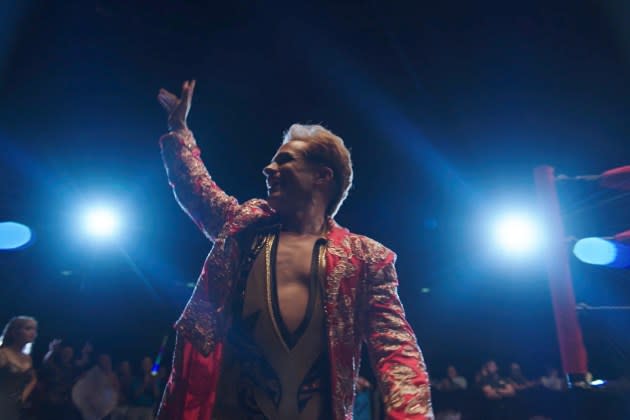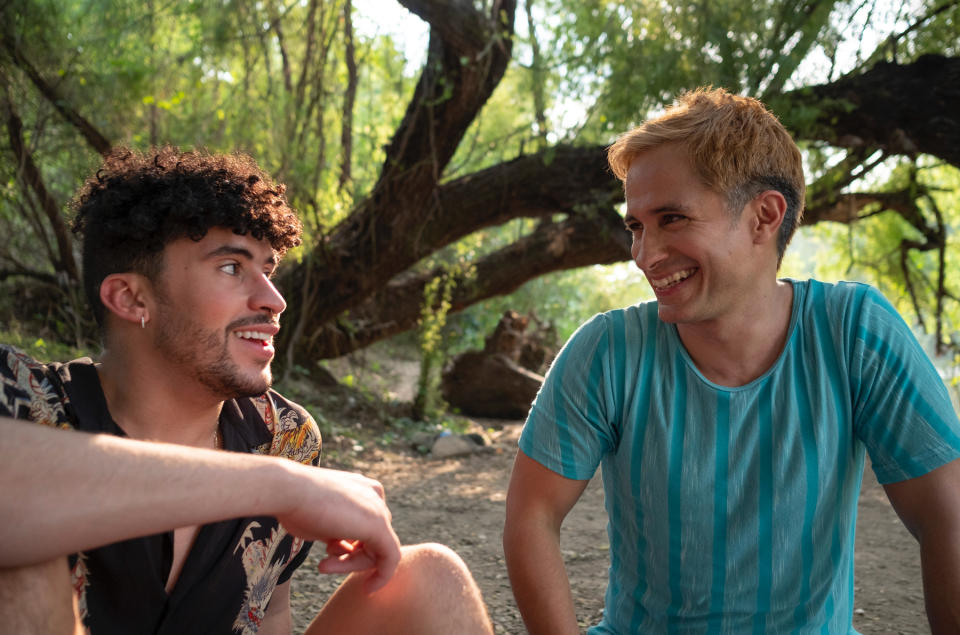How ‘Cassandro’ Turns the ‘Liberace of Lucha Libre’ Into an LGBTQ Icon
- Oops!Something went wrong.Please try again later.
- Oops!Something went wrong.Please try again later.

In the larger-than-life world of lucha libre, there are “technicos” (good guys who fight for truth, justice, and the rule-abiding way) and there are “rudos” (villains who lie, cheat, and steal victories). There’s also a third category that’s neither hero nor heel, however, and that’s the “exotico.” A relatively late addition to Mexican wrestling’s stable of archetypes, these male luchadors often dressed in drag and played camped-up caricatures of feminine men. They were the target of taunting by homophobic crowds, a sort of toxified comic relief used to build up the machismo of the other wrestlers by comparison. Exoticos weren’t the equivalent of rodeo clowns — these guys could grapple with the best of them. But in the hierarchy of the luchaverse, they were treated like something between a gimmick and a target. And they never, ever won.
Saúl Armendáriz (Gael García Bernal) knows this is how the game works. An aspiring luchador who lives in El Paso, Texas, he’s been wrestling on the semi-pro circuit in Ciudad Juárez for a while. His character is a masked bad guy named El Topo. Saúl’s sexuality is an open secret among his peers, who mock him on and offstage; he may play a rudo, yet he gets the same offensive, derogatory chants that exoticos get. Lucha remains his first love, but Saúl can’t find a lane. “They always cast you as the runt?” says Lady Anarquía (Roberta Colindrez), a renowned female wrestler who agrees to train with him. “They don’t see nothing else,” he replies.
More from Rolling Stone
Trans Boxers Are Stepping Into the Ring. Will the Sport Let Them Stay?
How Chappell Roan Found 'Complete Freedom and Euphoria' Making Her Debut Album
RBD's Christian Chavez Wants His LGBTQ Fans to Feel Seen - And He's Not Letting Homophobia Stop Him
Then Saúl has an idea. El Topo is scheduled to have a rematch with Gigántico, the technico that beat him last time they met. What if, instead of the masked villain that everyone expects, he shows up as Cassandro — an out-and-proud exotico that will out-peacock, outwit, and out-wrestle any and all opponents. He’ll reinvent himself and adhere to every cliché that the archetype demands, bait every homophobe and be called every horrible name. Except this time, it’s going to be different. Cassandro will leave the ring as the champion. Who cares what the promoter thinks? This time, the exotico is going to win.
Cassandro is the sort of biopic that crams in as much of its subject’s life as it can, from childhood flashbacks to fame, fortune, and fighting personal demons to a draw. (It drops on Amazon Sept. 22, after a brief theatrical run.) But the whole movie really hinges on the moment in which Saúl walks toward the ring for that pivotal match, and then it’s Cassandro who enters it — not a whole new persona so much as a whole new person. Done up in an exotico uniform of a tight, sleeveless red shirt and tiny jean shorts, he seems as shaky in this guise as a toddler taking their first steps. Then something happens. He hears the jeers of the crowd while a Spanish-language version of Gloria Gaynor’s “I Will Survive” plays over the loudspeakers, and it’s as if he’s reborn. His gestures become broad, his gait turns into a saunter. A bigot taunts him, and Cassandro bumps him with his ass before jumping over the ropes. He goes into a superhero crouch, before going a few rounds with Gigántico and getting thrown out of the ring. By the end, however, the crowd is chanting his stage name. Saúl has lost the match. But Cassandro has won the war.
You recognize what’s now a classic sports-movie moment, in which the agony of defeat is transformed into the thrill of victory simply by beating the odds and taking a chance. (See: the original Rocky.) Yet the way that Bernal plays this initial transformation turns this story into something besides a triumph-of-the-underdog tale. He shows you Saúl taking in the energy of the crowd, slightly in awe of the electric current he’s generating and suddenly overtaken by the power he’s unleashed within himself. We’ve seen him hiding or playing down his identity as a gay man when he’s in public spaces, in groups, even around his accepting mother (Perla De La Rosa) — now he embraces this part of himself wholeheartedly, and weaponizes it to stake a claim in the ring. Cassandro even tailors his moves to his opponent’s panic over being near a gay man, so now the “hero” is the butt of the joke. It’s Bernal’s performance in a nutshell: a high-wire balancing act of theatricality, smarts, ambition, hope, hurt, vulnerability, confidence, and the chops to back it all up. Sometimes in the same scene; occasionally in the same glance.
So you still get the standard biopic beats, of course, but thanks to Bernal, you also get a portrait of self-actualization — a caterpillar turning into a butterfly in a long, flowing sequined cape. It’s one of his single best performances to date, the kind of role that plays to his strengths (he’s a screen actor who knows exactly how to use his eyes to signal subtle emotional shifts) as well as letting him go big, broad, and balls-out in terms of physicality. He’s also the person that’s carrying this film on his slim shoulders, and director Roger Ross Williams knows it. An Oscar-winning documentarian, he’s tackled Cassandro’s story before, in the form of a nonfiction short for the New Yorker; Williams has said that the moment he saw the “Liberace of lucha libre” strut into the theater as fans screamed his name, he knew he’d found the subject of what would be his first narrative feature. It’s not that the filmmaker and his star aren’t interested in the wrestling aspect — that’s Bernal in the ring, flipping and grappling and deftly maneuvering real-life luchadors into pretzel shapes — so much as they know it’s only one aspect of the story. Becoming a lucha icon helped turn Saúl/Cassandro into an LGBTQ+ icon and a hero. But it didn’t stop him from wrestling with personal demons, either.

Bad Bunny and Bernal in ‘Cassandro.’
So in lieu of training montages leading up to the apex of Cassandro’s career, in which he takes on the legendary Son of Santos (playing himself here) in a broadcasted match, we get sequences of him and his mother watching Saúl’s dad, a married man with another family and who rejected his son’s homosexuality, from afar. We see him having sex and arguing with his closeted lover (Raúl Castillo). After a promoter sees the crowd go from screaming offensive epithets at Cassandro to cheering his name and figures he can parlay this exotico turn into gold, we see the future champ mixing with the friendly and shady types who work behind the scenes of lucha libre matches — or in the case of one handsome “gangster” (Benito Antonio Martínez Ocasio, though you likely know him as Bad Bunny), both at once. Triumph is followed by tragedy, triggering composer Marcelo Zarvos’ moody, melancholy score, and is then followed by bigger triumphs and a few bitter victories.
What Cassandro never does, however, is view its over-the-top hero as a campy joke or a novelty or a saint — all of which might have been the de facto route in the hands of other, less empathetic filmmakers. And if it treats what would normally be the big sports-movie finale less as a climax and more as an event along the path to other ups and down, that’s on purpose. Williams and Bernal aren’t focused on making a dramatized ESPN-friendly narrative or a melodrama about a gay man suffering the slings and arrows of intolerance. They’re far more interested in what resides in the thin middle of that Venn diagram, in which a luchador finds his authentic self in the most outrageous, over-the-top way possible, and revolutionizes a sport in the process. The real win happens beyond the ropes. And someone who’s now a legend in the lucha world is recognized as an IRL hero by the rest of us.
Best of Rolling Stone

